 |
|
SEVDAH BABY (Serbia)
Behind the producer name sevdahBABY stands Milan Stankovic, independent music author from Belgrade. The 20 something, classically trained talent formed his first band at the age of 15. A couple of years ago, a strong idea emerged: redneck folk music and ethno generally don’t have to be totally uncool. Even more, they can give a wicked flavour to something that is a product of Western musical tradition. So finally, the name which represents the connection of the different cultures was created. Sevdah, a word probably familiar to everyone from Balkans to Bosporus; means a feeling of sadness, pain, joy and rage all mixed up. BABY, well, was the first English, western word which came to his mind and sounded good. Like: ‘It’s sevdah, baby!’ This track here is taken from the excellent soundtrack to the not less fabulous film ‘Tu Pa Tam’, which was to a great extent composed by SevdahBABY.
|
| |
|
|
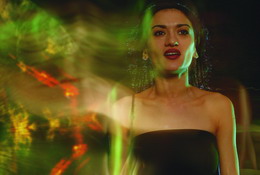 |
|
MITSOURA (Hungary)
Hungary-based Mitsoura was formed by the female singer Mitsou and others from the gypsy band Ando Drom. On their self-titled album Mitsoura mix a whole host of influences, mainly gypsy, ambient and Indian music to an extraordinary new and contemporary sound. Mitsou has a very special voice – one which you recognize at once. Despite being only 5 feet tall, she encompasses a wide spectrum of tones. She is a great talent within a long family line of Roma singers. Within this project, Mitsou has found a very contemporary bed of soundscapes and rhythm patterns to highlight her unique singing. A marriage of modern Western club music with traditional Gypsy music, all carried by Mitsou’s unique voice.
|
| |
|
|
 |
|
AZIS (Bulgaria)
Azis is Bulgaria’s most colorful star. A seven-foot, white-blond-haired, blue-eyed Gypsy known for cross-dressing, his music is mostly chalga, which is the Bulgarian equivalent of turbo folk, commercial folk-dance crossover music. He is just enormously talented and very charismatic, with ‘Anti-Geroi’ a monster hit. Azis has caused some controversy in Bulgaria with his provocative gay appearance and on the other hand his campaigning on behalf of the somewhat downtrodden Roma minority. As an entertainer he has recorded and performed many popular and traditional songs. Azis’s real name is Vassil Boyanov, and he comes from a Romani lineage.
|
| |
|
|
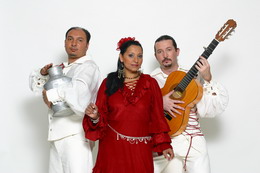 |
|
KARAVAN & BOBAN MARKOVIC (Hungary/Serbia)
The members of Karavan are well-trained world musicians with the experience of many years in the Hungarian music business. Their way of writing and performing music consists of putting together elements of gypsy music from Hungary, Russia, and the Balkans. Then during the process of arrangements Flamenco comes into play. When Boban Markovic, one of the giants of Balkan brass, heard the band’s demos, he instantly decided to work with Karavan. The result is simply irresistible, dynamic, and temperamental.
|
| |
|
|
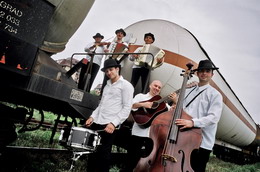 |
|
KAL (Serbia)
Kal are a hot Gypsy band from the suburbs of Belgrade, rock’n’roll in attitude, fuelled on urban beats and rooted in the Balkan blues. They call their style Rock’n’Roma: Kal – the word is Romani for ‘black’ – and were formed by the Ristic brothers, Dushan and Dragan, to confront the prejudices and clichés the Roma face. Dragan, a theatre producer who has set up Romani theatre groups in Budapest and Belgrade, and Dushan, a painter, aimed to use Kal to blend influences from traditional Balkan Gypsy music with the contemporary music they heard whilst living in Belgrade and Budapest. Kal’s music has a very positive feeling; each song makes you smile. They embrace diverse style, whilst still sounding original and on a high musical level.
|
| |
|
|
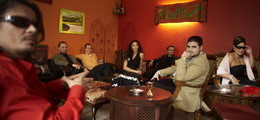 |
|
!DELADAP (Austria)
!DelaDap started around four years ago as a project idea in the studio of the prague born producer Stani Vana. It then developed first into a trio and later into a seven-member live ensemble. In Romanese language „dela dap“ means ‘to move something forward’. And that’s what they do. Now!DelaDap is turning into a more creative platform for Gypsy- rooted, Central-European world sound. Members of their live band include two Roma singers, a double-bass player and a violin player from Slovakia, as well as a drummer from Hunagry and a guitar player from Serbia. Several outstanding musicians from Central and Eastern Europe play parts as guests on the second !DelaDap album. World-fusion sophisticated!
|
| |
|
|
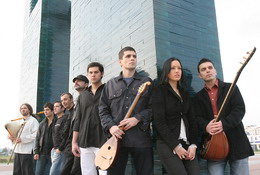 |
|
BIBER (Serbia)
The project Biber is a vocal-instrumental crossover between ambient, electro, acoustic and traditional ethno and modern pop sounds, which is pretty unique in this region and they find their strength in this very eclectic mixture.
The band was founded by professional musician Rastko Aksentijevic, who plays acoustic guitar, tambourine, shargija (a simple long-necked lute) and saxophone. Other members of the band include Bojan Vasic (piano and keyboards), Milorad Kocic (programmer) and Goran Simpraga (sound engineer and producer). For many years, they have been composing, playing together, producing and arranging music for many big names of the Serbian music scene. Their first album is a logical step forward to focus their energy on experimenting and searching for new sounds.
|
| |
|
|
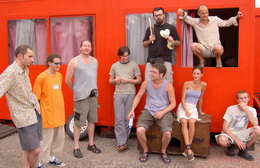 |
|
BESH O DROM (Hungary)
Besh O Drom is certainly one of Hungary’s best musical ambassadors. They blend influences and melodies from all over the Balkans with jazz and electronics. All this is mixed with breathtaking musical mastership. Their playful energy comes across as ‘in your face’ on disc, as well as live at their numerous concerts all over Europe. With constant female guest singers like Mitzou (Mitzoura) or Szaloki Agi they combine the sound of traditional Gypsy and Hungarian singing with modern drum sounds and grooves, as well as folk instruments like flutes. The whole lot comes out extremely danceable and passionate.
|
| |
|
|
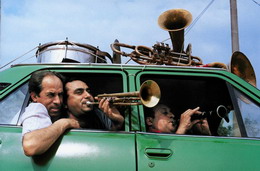 |
|
FANFARE CIOCARLIA (Romania)
Fanfare Ciocarlia are the figureheads of Balkan brass music and probably the fastest brass band on this planet. The twelve Romany Gypsy musicians originally come from a small village in East Romania, just near the border with Moldavia, where the band still lives today. Fanfare Ciocarlia manage to set off a musical firework display, with an unbelievable talent for intricate rhythms and dizzy tempos. Traditional dances from Romania and rhythms from Turkey, Bulgaria and Macedonia are played on horns, trumpets, clarinets and timpani. Melodies as well as instruments are passed on from generation to generation. Since Fanfare Ciocarlia was discovered by the ‘Western world’ in the late Nineties, they have toured almost every country and continent Catch them near you, they make you shake.
|
| |
|
|
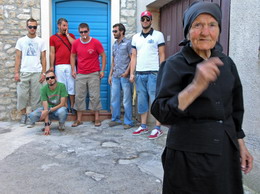 |
|
POSTOLAR TRIPPER (Croatia)
Postolar Tripper were never planned as an independent project. In 2003 Darko Predragovic and Davor Valcic were working on the radio programme «Generacija Ex» for local radio station RADIO 057. There they had the little feature «Man’ti sok» (The mad juice), where they regularly presented a chart of their 5 most stupid songs. This is how the imaginary artist Postolar Tripper (Old Shoemaker Tripper) came about. So far Postolar Tripper has only one album in its gallery, but which is packed with cracking smash hits. Now Postolar Tripper is no imaginary grandpa anymore, but a 7-piece band, who are constantly cooking up new crazy Balkan crossover tracks in their dirty kitchen.
|
| |
|
|
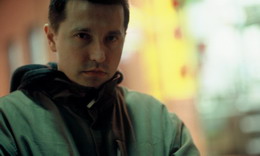 |
|
KIRILL (Macedonia/Croatia), Vlada Divljan (Serbia/Austria)
Native Macedonian Kiril began his musical journey in the early Eighties by teaming up with award-winning director Milcho Manchevski to form Bastion, one of the first electronic bands in Macedonia. He then went on to play with one of the most famous Macedonian bands ‘Leb i Sol.’ In 2000 the US label Tone Casualties released his album ‘Homebound’, which continued Kiril’s vision and concept. Kiril also writes music for film, television and theatre. His latest film project was Balcancan, directed by Darko Mitrevski. Kiril wrote and produced the soundtrack, including ‘Baba Zumbula’, featuring the voice of Vlada Divljan.Vlada Divljan was the founder, front man and principal music author of Idoli (The Idols) Since the 1984 disintegration of the cult Belgrade band, Divljan has been involved in a solo career as a pop artist and composing music for films. With Kiril, under the name of Aparatchicks, they have released one album. Baba Zumbula is their latest collaboration.
|
| |
|
|
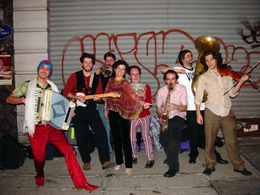 |
|
ROMASHKA (USA)
The word Romshka is a mix of Roma and Mashke, which is Yiddish for “liquor”. Romashka again is Russian for ‘daisy’. Romashka plays a mix of genuine Gypsy music from Russia, Romania, and beyond. Lithuanian-born singer Inna Barmash fronts the band of multifaceted American musicians and one half-Romanian-half-Japanese madcap accordionist, who brings years of Klezmer, jazz and rock experience to their Gypsy music journey. A driving force in the burgeoning New York gypsy and Balkan music scene, Romashka has held monthly dance parties at the infamous Mehanata. Now they have finally released their debut album. Their song ‘Loli Phabay’ is a Balkanbeats favourite of bittersweet, sepia-toned nostalgia.
|
| |
|
|
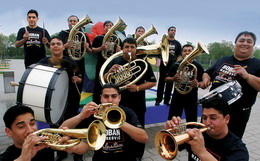 |
|
BOBAN MARKOVIC ORCHESTAR (Serbia)
The reason for Boban Markovic’s continuing success is evident: reinventing traditional Roma brass music with injections and adaptations of sounds from around the globe. The reigning king of Balkan Brass is the best trumpeter in Serbia, and has won the Golden Trumpet five times at the legendary Guca brass festival. His orkestar plays with impressive virtuosity, led by the master’s strong hand. But Boban and his trumpet are always at the centre of attention. Boban Markovic is now slowly handing over the orchestra to his 18-years-old son Marko. The young Markovic will also be seen in the next movie by Emir Kusturica. So the circle closes as the Boban Markovic Okestar had their breakthrough with the soundtrack to Kusturica’s movie ‘Underground’ more than ten years ago.
|
| |
|
|
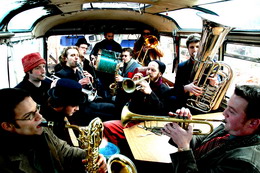 |
|
VA FAN FAHRE (Belgium)
Va Fan Fahre was set up in March 2003. The music is Balkan-brass-band-like and shows its Klezmer influence, but it is particularly the thoughtful arrangements that give the music extra originality. Funny brass riffs are sped up with Ska, suppmorted by funky grooves, and enriched by jazzy improvisations. Thirteen musicians worked on Va Fan Fahre’s debut album. The Belgian newcomers, who don’t sound Belgian at all, are now getting first recognition as an excellent live band. They are now touring Europe a lot and entered the European World Music Charts with their debut album.
|
| |
|
|
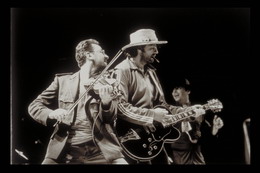 |
|
EMIR KUSTURICA AND THE NO SMOKING ORCHESTRA (Serbia)
The No Smoking Orchestra (Zabranjeno Pusenje in their original Serbo-Croatian language) has been a cult band in the Balkans since the 1980s. In, 1986 the famous film director Emir Kusturica (‘Underground’, ‘Time of the Gypsies’) took over the bass guitar in the band. In the Nineties, Stribor Kusturica, Emir’s son, also joined the band on drums. In 1998 the ‘No Smoking Orchestra’ composed the music for Emir Kusturica’s worldwide successful film ‘Black Cat, White Cat’, which also became the international breakthrough for the band. ‘The Moldavian Song’ is a beautiful little melancholic piece taken from the soundtrack to Kusturica’s latest movie ‘Life is a Miracle.’
|
|